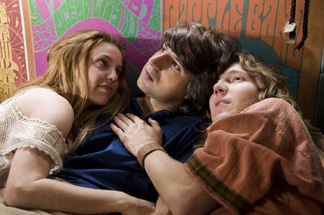Movie Review: Taking Woodstock
By Matthew Huntley
September 3, 2009
BoxOfficeProphets.com

It was the first time I had ever seen Woodstock, which was long and sometimes exhausting, but it ultimately proved to be an invocation of an indelible experience. To Ang Lee's defense, I probably would have like his Taking Woodstock more had the Oscar-winning documentary not already told me everything (and more) I needed to know about the historic three-day event that took place in the June of 1969. Lee's narrative version unfortunately has the dilemma of living in the shadow of a real, larger-than-life counterpart.
Lee has obviously seen and has a lot of respect for Wadleigh's Woodstock. Just consider all the devices and scenes he borrows from it: the use of split screen to show multiple events going on simultaneously; shots of the local patrons handing out free food to the concert's 400,000 attendees (the most notable item on the menu: an inordinate amount of oatmeal); three nuns giving peace signs to the camera; young people skinny dipping and making in love in the woods; long shots of the enormous crowd surrounding the wooden stage; and the massive clean-up after the concert on the mud-soaked dairy farm, now covered with garbage, blankets and clothes. There's even a scene adapted straight from the documentary when one of the actors speaks verbatim the dialogue of a Port-O-San employee, who lets us know he had one son at the concert and another in Vietnam.
Okay, so Lee is able to re-enact footage from the documentary using actors and sets. So what? I'm just thankful he didn't try to recreate any of the music performances without using the live footage (there are actually no music performances in the film), but even so, what is the purpose of this endeavor? I admire Lee's intentions of wanting to bring a revolutionary piece of American history to modern audiences, but why can't they just watch the documentary? There must have come a point when Lee thought he was making something redundant, not to mention inferior.
Perhaps he thought that's where the film's coming-of-age story comes in. It centers on a 20-something kid named Elliot Tiber (Demetri Martin), whose proudest achievement is being elected the youngest president of the Chamber of Commerce in the small town of Bethel, New York. During the summer season, Elliot returns from his interior design job in New York City to help his Russian-born, Jewish parents (Henry Goodman and Imelda Staunton) run the El Monaco Motel and "resort" on White Lake, although it could hardly be considered a resort. With their property facing imminent foreclosure, Elliot offers their land to organizers of the Woodstock music festival, who were recently rejected by the town of Wallkill because of a permit issue. The Woodstock committee initially rejects the Tibers' land because it's nothing but a swamp, but they do strike a deal with Elliot's neighbor, Max Yasgur (Eugene Levy), who has acres to offer at the right price.
The movie convinces us everything about Woodstock, from the early construction of the stage to the hordes of people riding in from all across the country, was seen through Elliot's eyes. It wants to be about how this revolutionary experience brought him out of his shell and taught him who he was.
The only problem is Elliot isn't nearly interesting enough to sustain an entire film. He shares some nice scenes with his strict, old-fashioned parents, but Demetri Martin plays Elliot as such a one-note, bland person that it's hard to find him engaging or worthy of an entire story arc. The changes he undergoes are inherently dramatic, but we're so apathetic towards him we don't feel their impact (even the acid trip seems wasted). I guess this is because Elliot is so mellow and practical a person to begin with. He's sort of conservative, but overall he's a nice, relaxed guy who can make friends with anybody. Therefore, the major changes he undergoes through aren't giant leaps from what he already is. The fact this character is based on the real-life Elliot Tiber (whose memoir inspired this story) doesn't make much of a difference since it's the movie version we need to like and find appealing, and he's sort of a bore.
On the other hand, I did respond to Goodman and Staunton as Elliot's parents, whose spirits and attitudes make us smile and laugh. They breathe some much-needed zest into this story, along with the movie's most interesting character, a transvestite name Vilma (Liev Schreiber), who also delivers the movie's best line. Schreiber plays him (or is it her?) with a matter-of-fact, gentle quality, but he's able to maintain an intimidating presence. Elliot eventually hires Vilma to be a security guard for the hotel, a premise that could make a funny movie all its own and would surely benefit from Schreiber as its star.
Taking Woodstock isn't a bad movie. It's just not a very necessary one. All of its re-creations and re-enactments of the real Woodstock are accurate but lack the vigor, myth and grandness of the documentary, while the coming-of-age tale is too unaffecting to really care about. Baby boomers and festival attendees may find something worthwhile here because of the memories it will trigger, but for those of us who can only get a feel for the real experience, our best bet is to stick with the original Woodstock.